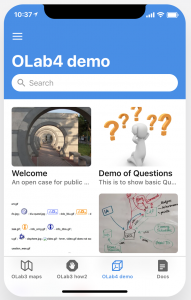Often, the easiest way to see how OpenLabyrinth virtual scenarios work is to look at a few examples.
Check out our listing on Google Drive for interesting examples and what they are about. You can even download the actual MVP zip file in some cases so you can install it on your own server and take it apart!
There are also many sites out there which offer libraries of OpenLabyrinth cases that you can explore in more detail:
- Scholars Portal: OLab Dataverse – a repository of published cases with searchable metadata
- OpenLabyrinth v3 production server with cases at University of Calgary
- European Virtual Patients (eViP)
- Melina+ (Medical Education Linked Arena) – a mEducator 3 project
- OpenLabyrinth v3 demo server – running latest beta software has many open cases to play
- OLab4 demo server — mostly test cases at present
We do have a small app that you can use to find and play some of our exemplar cases. This can be a bit slow to load on some devices: https://olab4.glideapp.io — for more info on the app, we have an introductory page here.

There are also some older repositories that are currently undergoing web upgrads but should come back online:
- Pathways in Narrative Education (PINE) library
- SharcFM cases at CFPC
- St George’s University London library of cases
If you are looking for a case about a specific topic, we have a simple tip for finding relevant OpenLabyrinth cases: include the word “openlabyrinth+” in your Google search e.g.
openlabyrinth+ chest pain
Adding the “+” sign emphasizes to Google that you really only want hits that include “openlabyrinth”. Because many OpenLabyrinth server admins have left their servers open to the search robots, you will get some additional case examples that way.
